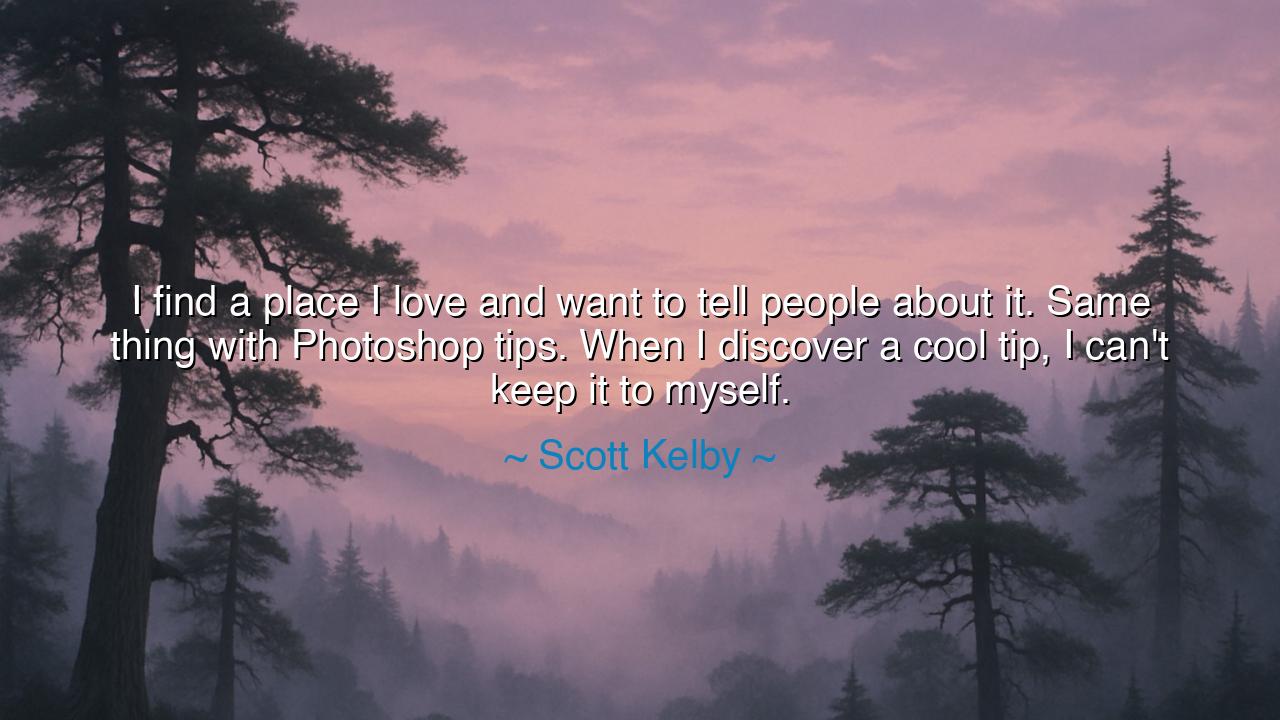
I find a place I love and want to tell people about it. Same
I find a place I love and want to tell people about it. Same thing with Photoshop tips. When I discover a cool tip, I can't keep it to myself.






"I find a place I love and want to tell people about it. Same thing with Photoshop tips. When I discover a cool tip, I can't keep it to myself." With these words, Scott Kelby taps into a deep, almost primal desire to share the things that ignite our passion. Whether it is a beautiful place, an inspiring experience, or a newfound tool or skill, the instinct to share becomes an expression of joy—joy that is made even richer when it is passed on to others. In this sense, the act of sharing is not only about communicating information but about spreading the light of discovery. Kelby’s passion for sharing his Photoshop tips is not just about the technical aspect of teaching but about the connection it fosters between people through shared knowledge.
In the ancient world, the importance of sharing knowledge was regarded as one of the most noble pursuits. The Greek philosophers valued the idea of passing on wisdom and believed that it was through the exchange of ideas and experiences that both individuals and society could grow. Socrates, in particular, understood the power of teaching and dialogue, famously engaging in conversations where ideas were shared and tested. Plato too saw the value of knowledge as something meant to be shared for the betterment of all, and it is through his works that much of Socratic philosophy was passed down. These ancient philosophers viewed the act of teaching, of passing on knowledge, not as a mere transaction, but as a sacred duty—an offering to the future that would ensure the continuous flourishing of both mind and society.
The act of sharing knowledge, as Kelby does with his Photoshop tips, mirrors a deeply human impulse that has existed since the dawn of civilization. Whether it’s a new discovery or a simple insight, the urge to share becomes an act of both self-expression and connection. Consider the early human storytellers, who passed down tales of great hunts, myths, and wisdom through spoken word. Their stories were not only a way of communicating information, but of preserving the heart of their culture. These stories served as bridges, linking generations and allowing the lessons of the past to live on in the present. Just as these ancient storytellers couldn’t keep their knowledge to themselves, so too does Kelby share what he has discovered with the world.
Similarly, consider the Renaissance period, a time when artists, scientists, and scholars alike were dedicated to sharing knowledge and advancing human understanding. Leonardo da Vinci, whose work spanned the realms of art, science, and engineering, was a man driven by the need to both create and share. His notebooks, filled with sketches, inventions, and observations, were a testament to his desire to communicate his discoveries. But Da Vinci’s desire was not merely to keep his discoveries to himself. Rather, he sought to inspire and share his knowledge with others, so that humanity could build upon the foundation he laid. Just as Da Vinci believed that knowledge should be shared and expanded, Kelby believes that the tools and tips he uncovers in the world of Photoshop should not remain hidden, but rather spread so others may benefit.
The lesson in Kelby’s words is clear: the joy of discovery is amplified when shared. When we find something we truly love—whether it is a place, an idea, or a tool—we do not keep it to ourselves but offer it to others, allowing them to experience the same joy we have felt. This act of sharing is an expression of generosity and connection, and in a world that often feels fractured and disconnected, such acts become the ties that bind us together. Whether it is a secret tip for a creative tool or a piece of wisdom learned from life, the act of sharing enriches the world, giving others the opportunity to learn, to grow, and to expand their own horizons.
In practical terms, we must embrace the joy of sharing knowledge in all areas of our lives. We are not meant to hoard the wisdom we gain but to offer it freely to those around us, just as Socrates did through his dialogues or Leonardo da Vinci did through his inventions and art. Each time we discover something new, whether it’s a skill, a tool, or a perspective, we should ask ourselves: "How can I share this with the world? How can I make others’ lives better through what I have learned?" Whether it’s through teaching, mentoring, or simply offering advice, we all have the opportunity to enrich others' lives by passing on the wisdom we have gained.
So, let us be like Scott Kelby—like the ancient philosophers, storytellers, and Renaissance thinkers—and take joy in sharing the knowledge we uncover, the tips we discover, and the lessons we learn. Let us not keep these treasures to ourselves, but instead, offer them to others so that the world may be made richer, not by the things we accumulate, but by the ideas and insights we pass along. Through this, we will not only help others grow, but in the process, we will grow ourselves. This is the true joy of discovery—it is not in what we keep, but in what we give away.






AAdministratorAdministrator
Welcome, honored guests. Please leave a comment, we will respond soon